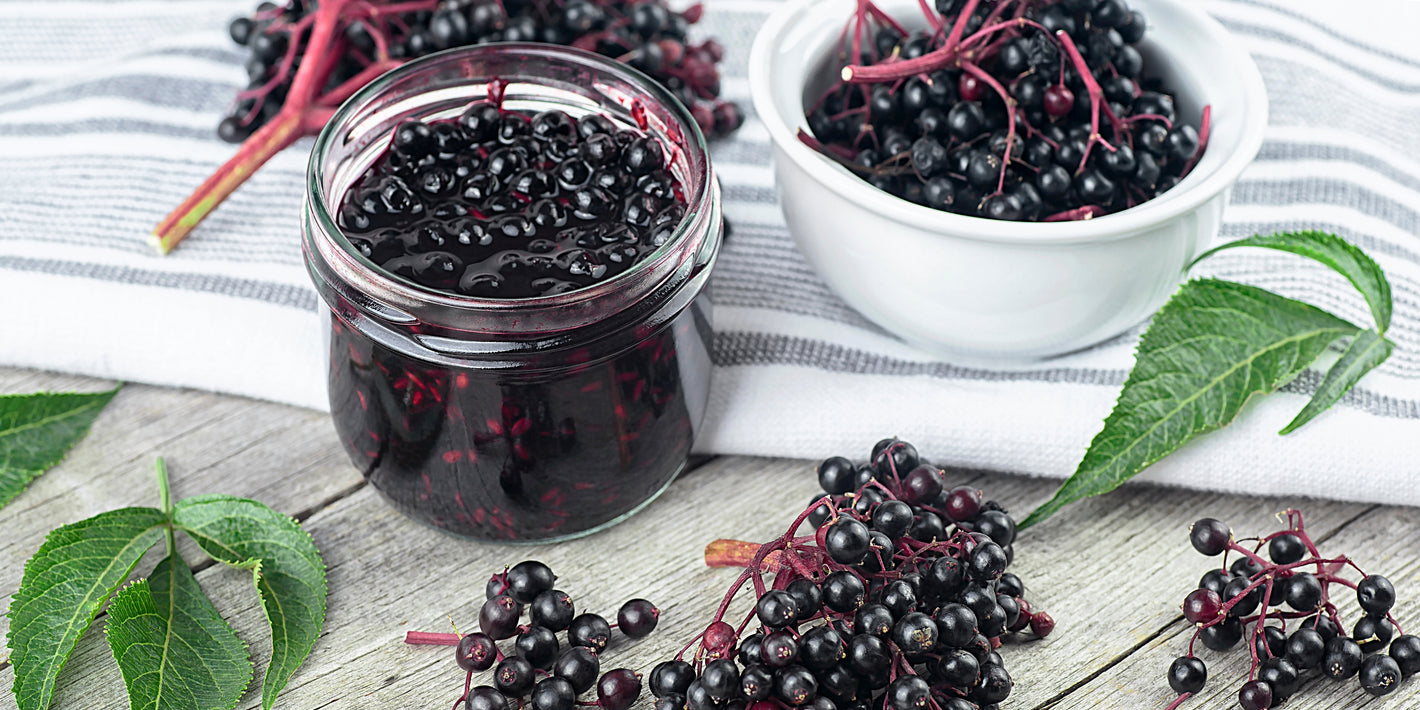
Black Elderberry: The Superfood Secret for Gut Health and Immunity
Introduction to Black Elderberry: Origins and Historical Use
Black elderberry, or Sambucus nigra, is celebrated not only for its deep, rich flavours but also for its versatile medicinal properties. This small yet mighty berry has a history that dates back to ancient times, finding its place in folklore and traditional medicine across Europe, North Africa, and North America. The ancient Egyptians revered elderberry for its health benefits, particularly its skin-improving qualities and its use as a heal-all for burns and infections. In medieval Europe, it was considered a holy tree capable of warding off evil; its berries, leaves, and bark were key components in medicines and tinctures.
Traditionally, elderberries have been utilised to treat a myriad of conditions, from colds and flus to inflammations and even pain. Native Americans and Europeans alike have made use of its flowers, bark, and berries to prepare remedies for dental pain, skin conditions, and digestive issues. This historical usage has paved the way for modern scientific research, which seeks to understand and validate the full spectrum of elderberry's health benefits.
Nutritional Profile of Black Elderberry
Elderberries boast an impressive nutritional profile rich in antioxidants, vitamins, and minerals that contribute to their reputation as a superfood. These berries are particularly high in vitamin C, an essential nutrient that supports the immune system and skin health, and dietary fibre, which promotes digestive health. Additionally, they are a good source of phenolic acids—powerful antioxidants that help reduce damage from oxidative stress in the body—and flavonols like quercetin, kaempferol, and isorhamnetin.
The presence of anthocyanins, compounds that give the berries their characteristic dark purple colour, also adds to their health-promoting properties. These antioxidants have been studied for their anti-inflammatory and anti-viral effects, making elderberries a potent natural remedy for various inflammatory and viral conditions. The combination of these nutrients makes elderberries an excellent addition to any diet, aimed at boosting overall health and preventing disease.
Black Elderberry and the Immune System

The immune-enhancing properties of black elderberry are among its most significant health benefits. The rich antioxidant content helps stimulate the body's immune response, aiding in the fight against pathogens. This is particularly important during the cold and flu season, as elderberry has been shown to not only reduce symptoms but also shorten the duration of illnesses. Its action in boosting cytokine production, a critical process in immune signaling, highlights its role in enhancing immune defence mechanisms.
Furthermore, elderberries have been found to increase the production of inflammatory cytokines, which are vital for the immune system’s response to infection. This dual action of both boosting natural defence and managing inflammation makes elderberry a unique ally in maintaining immune health, particularly in a natural, holistic way that can complement traditional medical treatments.
The Gut-Health Connection: How Black Elderberry Supports Digestion
Elderberries contribute positively to gut health through their significant fibre content, which aids in digestion and maintains regular bowel movements. This fibre acts as a prebiotic, providing necessary nutrients for beneficial gut bacteria to thrive, which is crucial for a healthy digestive system and overall wellness. A well-balanced gut flora is associated with numerous health benefits, including improved digestion and a reduced risk of chronic disease.
In addition to fibre, the anti-inflammatory properties of elderberries help soothe the gut lining, reducing the discomfort associated with inflammatory bowel conditions such as Crohn's disease or ulcerative colitis. By promoting gut health and supporting the immune system, elderberries ensure the body's defences are optimal and the digestive process is smooth and unhindered.
Scientific Studies: What Research Says About Black Elderberry
Recent research has highlighted the role of elderberries in health and medicine, with studies corroborating its efficacy in immune support and anti-inflammatory action. Clinical trials have shown that elderberry extract can significantly reduce the length and severity of the common cold and influenza, making it a valuable supplement during flu seasons. These studies underscore elderberry’s potential as a preventive and therapeutic agent, particularly in viral infections.
Moreover, ongoing research is exploring elderberry's potential in regulating blood sugar levels and enhancing heart health, promising broader implications for its use in chronic disease management. This growing body of scientific evidence not only supports traditional uses but also opens new avenues for employing elderberry in modern medicine.
Elderberry Syrups and Supplements: Benefits and Usage
As elderberry's popularity grows, so does the variety of available supplements and products, such as syrups, capsules, and gummies. Elderberry syrup is especially popular for its ease of use and its quick absorption into the body. These supplements typically combine elderberry extract with other immune-boosting ingredients like zinc and vitamin C, enhancing the overall health benefits. When selecting an elderberry supplement, it is crucial to choose products from reputable sources that provide clear information about the concentration of elderberry extract and the absence of unnecessary additives.
For those using these supplements, it is important to follow dosage recommendations to maximise health benefits. Typically, elderberry supplements are taken at the first sign of immune distress or as a preventive measure during the cold and flu season. However, consistency and proper timing in taking these supplements can significantly influence their effectiveness in boosting immune health.
DIY Elderberry Remedies for Home Use
Creating your own elderberry remedies can be a rewarding and health-promoting project. Homemade elderberry syrup, for instance, can be prepared by simmering dried elderberries with water and honey, creating a potent concoction that can be used to boost immunity or alleviate cold and flu symptoms. This DIY approach allows for customisation of ingredients to suit personal health needs and preferences, such as adding ginger or cinnamon for additional anti-inflammatory benefits.
Another popular homemade remedy is elderberry tea, which can be made from dried elderberries or elderberry tea bags. This can be a soothing way to enjoy the benefits of elderberries, especially during the colder months. When preparing these remedies, it is vital to ensure that all elderberry products are cooked properly, as raw elderberries contain compounds that can be toxic if ingested.
Precautions and Side Effects of Black Elderberry
While elderberry offers numerous health benefits, it is not without its precautions. Raw elderberries, as well as the leaves and stems of the plant, contain lectins and cyanogenic glycosides, which can cause nausea, vomiting, and diarrhea if consumed. Therefore, it is critical to use only properly prepared elderberry products and avoid homemade remedies from raw or unripe berries.
Furthermore, elderberry should be used with caution by those who are pregnant or breastfeeding, and it is not recommended for children under the age of one due to the honey often used in elderberry syrups. As with any supplement, it is advisable to consult with a healthcare provider before starting any new treatment, especially for those with underlying health conditions or those taking prescription medications, as elderberry can interact with certain drugs.
Comparing Elderberry with Other Superfoods for Gut Health
Elderberry stands out among superfoods for its immune and gut health benefits, but how does it compare to others like kombucha, kefir, or blueberries? Kombucha and kefir are fermented foods, rich in probiotics, which directly populate the gut with beneficial bacteria. This can lead to improved gut health and a strengthened immune system. Blueberries, like elderberries, are high in antioxidants and fibre, which contribute to heart health and reduced inflammation.
Each of these superfoods brings unique benefits to the table, making them valuable additions to a balanced diet. However, elderberry’s specific antiviral properties and its ability to significantly reduce the duration of colds and flus make it particularly useful for those looking to boost their immune system quickly and effectively.
Incorporating Black Elderberry into Your Diet for Optimal Health
Integrating elderberry into your diet can be as simple as taking a daily supplement or as creative as incorporating the berry into recipes. Elderberry syrup can be drizzled over pancakes, mixed into yogurt, or used as a sweetener for tea. For a holistic health approach, combining elderberry with other immune-supporting foods like citrus fruits, garlic, and ginger can enhance its benefits.
Additionally, regular consumption of elderberry can be particularly beneficial during the cold and flu season or whenever the immune system is vulnerable. By making elderberry a part of your daily routine, you can enjoy not only its health-boosting benefits but also its delicious taste.
Summary
- Historical Use: Black elderberry has a rich history in traditional medicine across Europe and North America, used for its healing properties in various cultures.
- Nutritional Profile: Rich in antioxidants, vitamins (especially Vitamin C), and minerals, elderberries boost health with their high levels of phenolic acids and flavonols, which fight oxidative stress and inflammation.
- Immune System Benefits: The berry enhances immune defence by stimulating cytokine production and has been shown to reduce the duration and severity of colds and flus.
- Gut Health Support: Elderberries aid in digestion and promote gut health through their dietary fibre content, which nurtures beneficial gut bacteria and helps maintain a healthy digestive system.
- Scientific Validation: Recent studies confirm elderberry's efficacy in immune support and anti-inflammatory action, with ongoing research into its broader health benefits.
- Supplements and Syrups: Available in various forms like syrups and capsules, these supplements should be chosen carefully for quality and used according to recommended dosages.
- DIY Remedies: Homemade elderberry remedies such as syrups and teas can be made for personal use, offering customisable and natural health benefits.
- Precautions: Raw berries and parts of the elderberry plant can be toxic; only properly prepared products should be used. People who are pregnant, breastfeeding, or have certain health conditions should consult with a healthcare provider before use.
- Comparison with Other Superfoods: While kombucha and kefir provide probiotics for gut health and blueberries offer similar antioxidant benefits, elderberry is unique for its antiviral properties and immune support.
- Dietary Incorporation: Elderberry can be easily included in the diet through supplements or creatively used in recipes to enhance both health and flavour, especially beneficial during the cold and flu season.
Prebiotic Information
For everything you need to know about prebiotics and prebiotic supplements, check out our comprehensive information page here.
Prebiotic
Biosphere Nutrition’s Prebiotic Powder is a unique blend of Sunfiber® and Black Elderberry Extract, designed to nurture gut health and support the immune system. This easy-to-mix, great-tasting formula ensures optimal absorption and digestive comfort. To learn more about our Prebiotic, check out the product page here.









